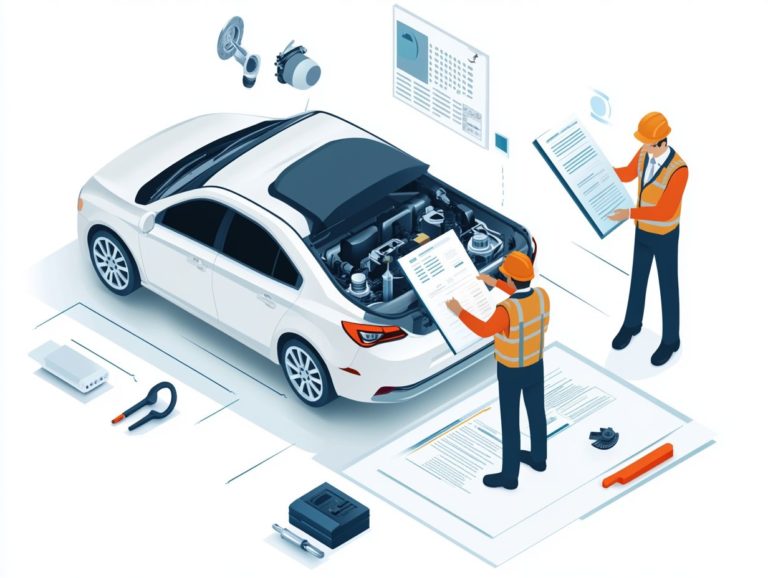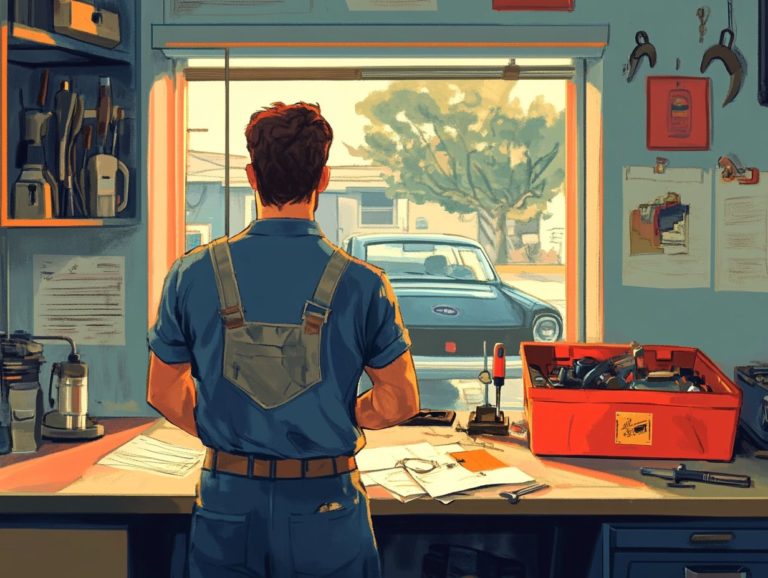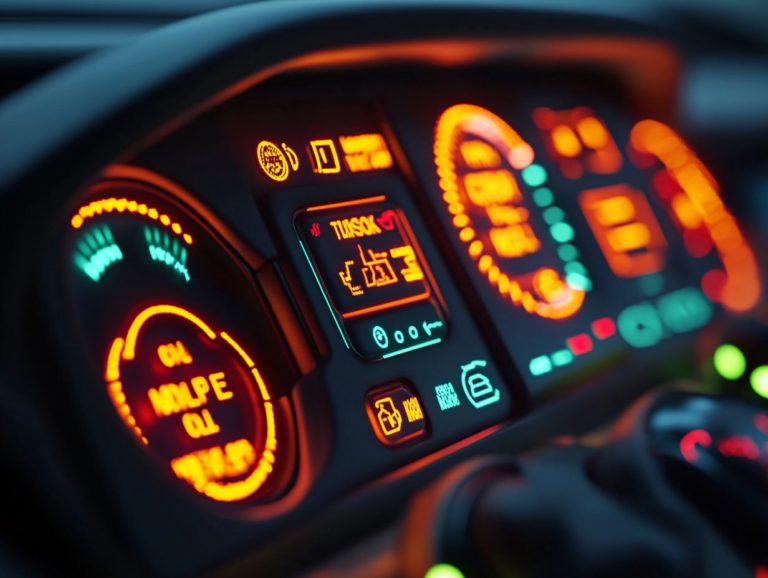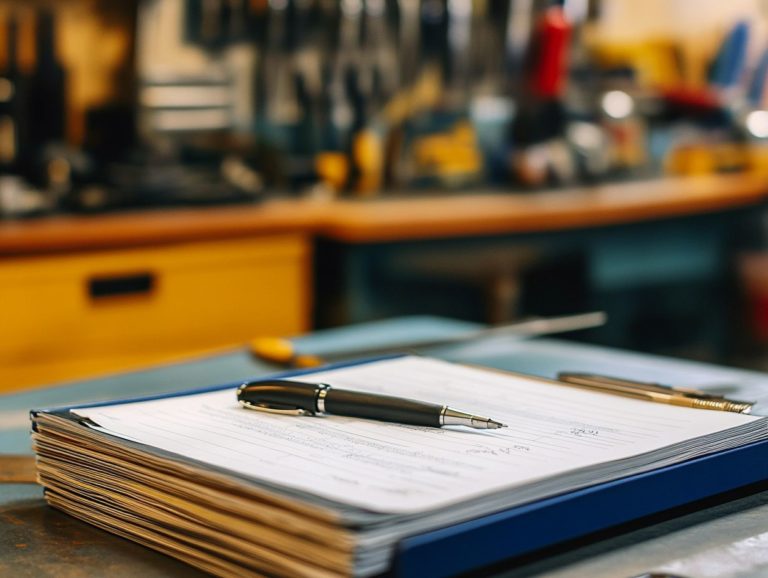5 Benefits of Regular Car Maintenance
Regular car maintenance is not just a chore. It’s an investment in your safety and savings!
This piece will guide you through five compelling benefits of keeping your car in peak condition. From saving money over time to enhancing your safety on the road, each benefit is crucial.
We’ll delve into the essentials of car maintenance, how often you should service your vehicle, and the key signs that indicate it s time for a check-up.
You ll discover how a bit of attention today can prevent significant issues tomorrow and help preserve your car’s value for years to come.
Contents
- Key Takeaways:
- 1. Saves Money in the Long Run
- 2. Improves Safety on the Road
- 3. Increases the Lifespan of Your Car
- 4. Maintains Fuel Efficiency
- 5. Helps with Resale Value
- What Does Regular Car Maintenance Include?
- Frequently Asked Questions
- What are the 5 benefits of regular car maintenance?
- How does regular car maintenance extend the life of my vehicle?
- Will regular car maintenance improve my car’s fuel efficiency?
- How does regular car maintenance affect my car’s performance?
- Is regular car maintenance important for my safety?
- Will regular car maintenance save me money in the long run?
Key Takeaways:
- Regular maintenance saves you money by preventing major issues.
- Proper maintenance ensures all components work correctly, improving safety.
- Consistent upkeep extends the lifespan of your vehicle.
1. Saves Money in the Long Run
Investing in regular car maintenance is a smart move. Following 5 tips for maintaining older vehicles saves you money in the long run by preventing unexpected, costly repairs and extending your vehicle’s lifespan.
By turning to local experts like Yankee Ford in South Portland, you ensure your car gets essential scheduled services, including vital tasks like fluid checks and oil changes.
Paying attention to these service points significantly boosts your vehicle’s performance and reliability. A well-structured maintenance plan can lead to savings of up to 30% on repair costs, allowing you to catch potential issues before they escalate.
Statistics show that cars receiving regular maintenance can last an average of 15% longer than those that are neglected. This makes a compelling argument for routine upkeep. Understanding the benefits of regular vehicle inspections highlights how these proactive measures enhance your safety on the road and provide you with invaluable peace of mind, proving that prioritizing maintenance is genuinely worth the investment.
2. Improves Safety on the Road
Regular car maintenance is essential for enhancing safety on the road. Following the 5 essential maintenance tips for new cars helps you address potential issues like brake failures and engine troubles before they escalate into serious hazards.
Routine brake inspections are crucial for spotting worn-out pads or leaks in the brake lines, both of which could lead to catastrophic failures. According to the National Highway Traffic Safety Administration (NHTSA), proper maintenance can prevent up to 90% of brake-related accidents.
Regular engine checkups ensure that vital components, such as belts and filters, are functioning at their best. This significantly minimizes the risk of breakdowns or engine fires.
By being proactive with these maintenance checks, you not only protect yourself but also contribute to the overall safety of the roads, potentially saving lives in the process.
3. Increases the Lifespan of Your Car
Following a regular maintenance schedule can significantly extend the lifespan of your car. It ensures that critical components receive timely care from oil changes to regular car washes for cleaning out old fluids.
Battery checks and suspension inspections are crucial for preserving your vehicle s functionality. A well-maintained battery guarantees reliable starts and supports the electrical systems, while thorough suspension checks enhance stability and comfort on the road.
When you consistently monitor these elements, your driving experience transforms. It becomes smoother and safer. By investing time in your car’s upkeep, you re likely to encounter fewer breakdowns, leading to lower repair costs and a more enjoyable journey overall.
In conclusion, regular car maintenance is vital for your vehicle’s performance, safety, and longevity. Be aware of the common myths about car maintenance to make informed decisions. Schedule your next maintenance appointment today to ensure your car remains in top condition!
4. Maintains Fuel Efficiency
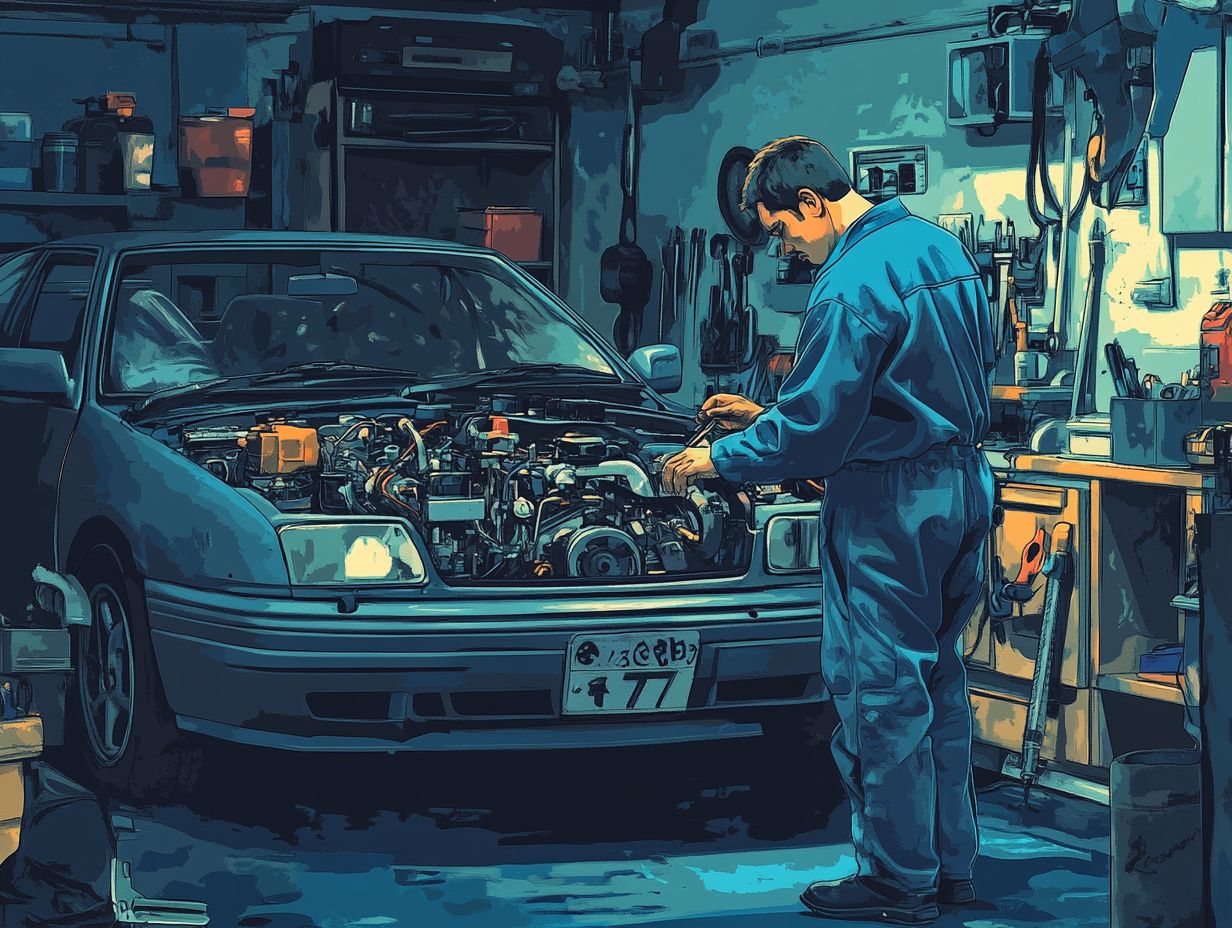
Regular vehicle care is essential for maintaining optimal fuel efficiency. Ensure proper care by checking tire pressure and scheduling timely oil changes.
Keeping oil filters clean can significantly reduce unnecessary fuel consumption and promote a healthier engine. Neglecting these maintenance tasks can lead to higher fuel costs.
Low tire pressure makes it harder for your car to move, which demands more energy and increases greenhouse gas emissions. Similarly, if you skip oil changes, dirty oil cannot lubricate the engine properly, causing friction that hampers performance.
These oversights undermine eco-friendly driving practices and add to environmental pollution. Prioritizing regular maintenance is not just good for your vehicle; it s also a wise choice for your finances and the planet.
5. Helps with Resale Value
Maintaining detailed maintenance records not only contributes to your vehicle’s overall health but also enhances its resale value. Potential buyers prefer cars that boast a verified service history.
A well-documented service history builds trust among prospective buyers, making them more willing to consider higher offers. Proof of regular upkeep like oil changes, tire rotations, and inspections gives buyers confidence in their investment.
Choosing reputable service centers, like JCs Auto Repair Shop or Foreign Affairs Motorwerks, further validates this history, showcasing that your car has been well cared for by professionals. This reassurance enhances the vehicle’s perceived condition and may even lead to better price negotiations.
After all, documented maintenance signals reliability and significantly boosts overall desirability.
What Does Regular Car Maintenance Include?
Regular car maintenance includes a range of scheduled services designed to keep your vehicle in peak condition. From routine oil changes to comprehensive engine checkups, these tasks ensure everything operates seamlessly.
These activities are vital for extending your vehicle’s life and ensuring the safety of everyone on board. Services like tire rotations ideally performed every 5,000 to 7,500 miles promote even tire wear and enhance fuel efficiency.
Replacing air filters every 15,000 to 30,000 miles allows your engine to breathe properly, boosting performance and reliability.
Establishing maintenance reminders can be incredibly beneficial. They help you track these essential intervals, minimizing the risk of neglect that could lead to costly repairs. Regular upkeep enhances your vehicle’s performance and provides invaluable peace of mind.
How Often Should a Car Be Serviced?
A comprehensive maintenance schedule helps you determine how often your car should be serviced. Generally, it’s advisable to recommend oil changes and essential fluid checks every 3,000 to 5,000 miles, though this can vary based on your vehicle’s specifications and driving conditions.
Factors like the type of vehicle be it a compact car, an SUV, or a truck along with its age and mileage, play a crucial role in establishing the ideal servicing interval. For instance, if you own a high-performance vehicle, it may need more frequent attention due to its demanding driving conditions.
If you navigate urban environments with stop-and-go traffic, be mindful of the extra strain on your engine. In such cases, a stricter maintenance routine might be necessary to keep your vehicle running smoothly.
What Are the Most Important Car Components to Maintain?
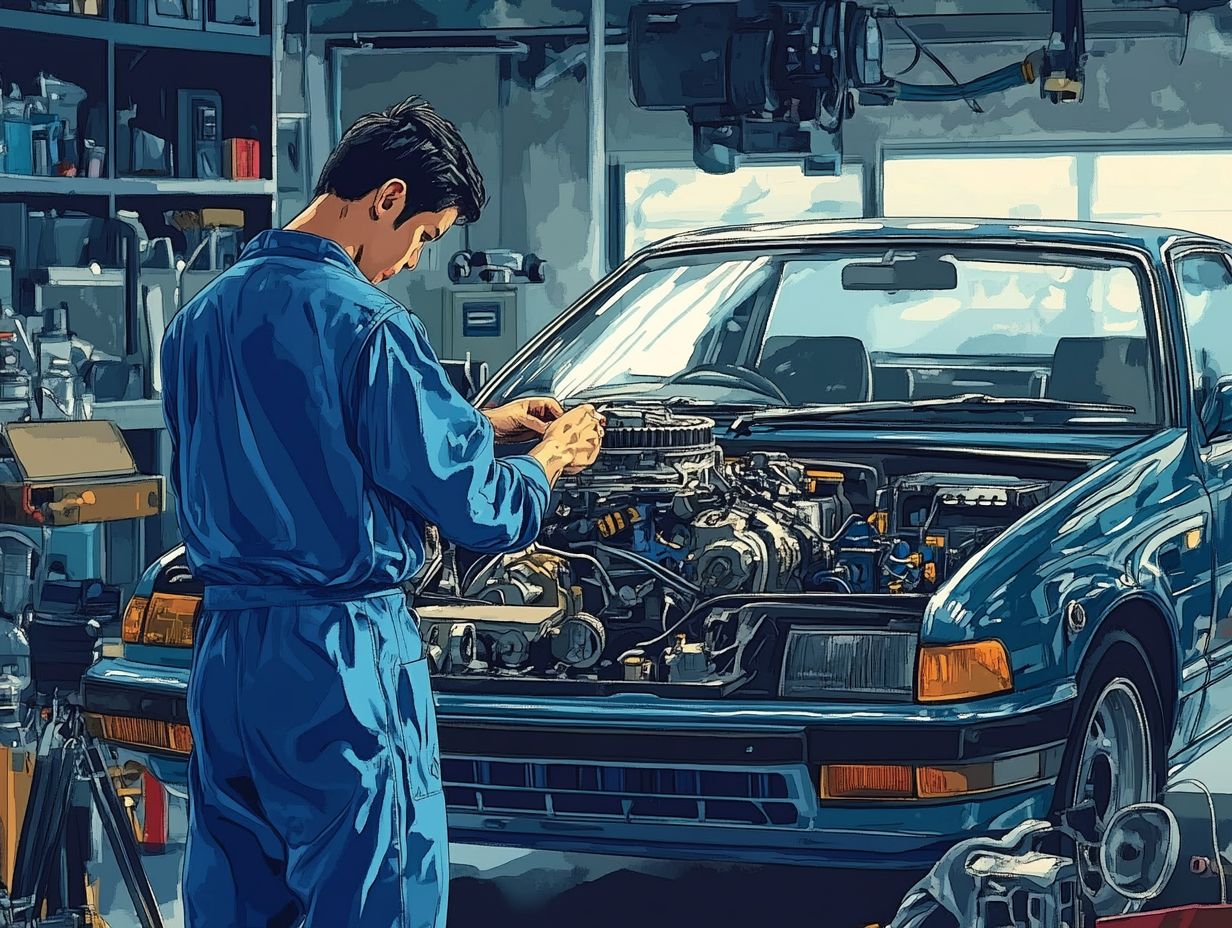
Key components that demand your regular attention for optimal vehicle performance include the brake system, engine, tires, and battery. Each part plays an essential role in your vehicle’s safety and efficiency.
The brake system helps you stop safely. Neglecting to check its condition can lead to dangerous situations on the road.
The engine is the heart of your vehicle. Ignoring its maintenance can result in poor performance or expensive repairs.
Tires aren t just about traction; they also significantly impact fuel efficiency. A failing battery can leave you stranded when you least expect it.
By prioritizing routine maintenance in these areas, you dramatically enhance safety, longevity, and reliability, ensuring that your journeys remain secure and efficient.
What Are the Signs That a Car Needs Maintenance?
Recognizing the signs that your car needs maintenance is crucial. Common indicators include dashboard lights, unusual driving behavior, and decreased performance. These could signal potential engine damage or emissions issues.
Be alert to sounds like grinding or squeaking when you brake, fluctuations in temperature on the gauge, or any vibrations that feel unusual. These hints can precede more significant problems.
When a warning light appears, take immediate action. Your owner’s manual can help clarify the issue, and visiting a trusted mechanic can prevent complications later on.
Regular check-ups and fluid level inspections are key to keeping your vehicle s performance at its best.
Can Regular Maintenance Prevent Major Car Issues?
Engaging in regular maintenance and check-ups is your best strategy for preventing major car issues. It’s also important to avoid common car maintenance mistakes, as identifying potential problems early reduces repair costs and enhances reliability.
Consider a fleet of delivery trucks that implemented a rigorous preventive maintenance program. They caught minor leaks and brake issues before they escalated. This proactive approach saved them thousands in emergency repairs and minimized downtime.
As a personal vehicle owner, consistent servicing helps you avoid costly engine repairs that often arise from neglect. When you prioritize regular check-ups and routine care, the long-term savings can far exceed the initial investment.
What Are the Consequences of Neglecting Car Maintenance?
Neglecting car maintenance can lead to serious consequences, including rising repair costs, engine damage, and those dreaded unexpected breakdowns. These issues undermine your vehicle’s reliability and safety.
Failing to conduct regular inspections can worsen these problems. For example, studies show that skipping oil changes leads to engine wear, with repair costs potentially soaring into the thousands.
Vehicles that don t receive proper maintenance are 60% more likely to break down, leaving you stranded and possibly unsafe on the road.
This compromises your safety and can cut your fuel efficiency by as much as 30% that s money down the drain!
Frequently Asked Questions
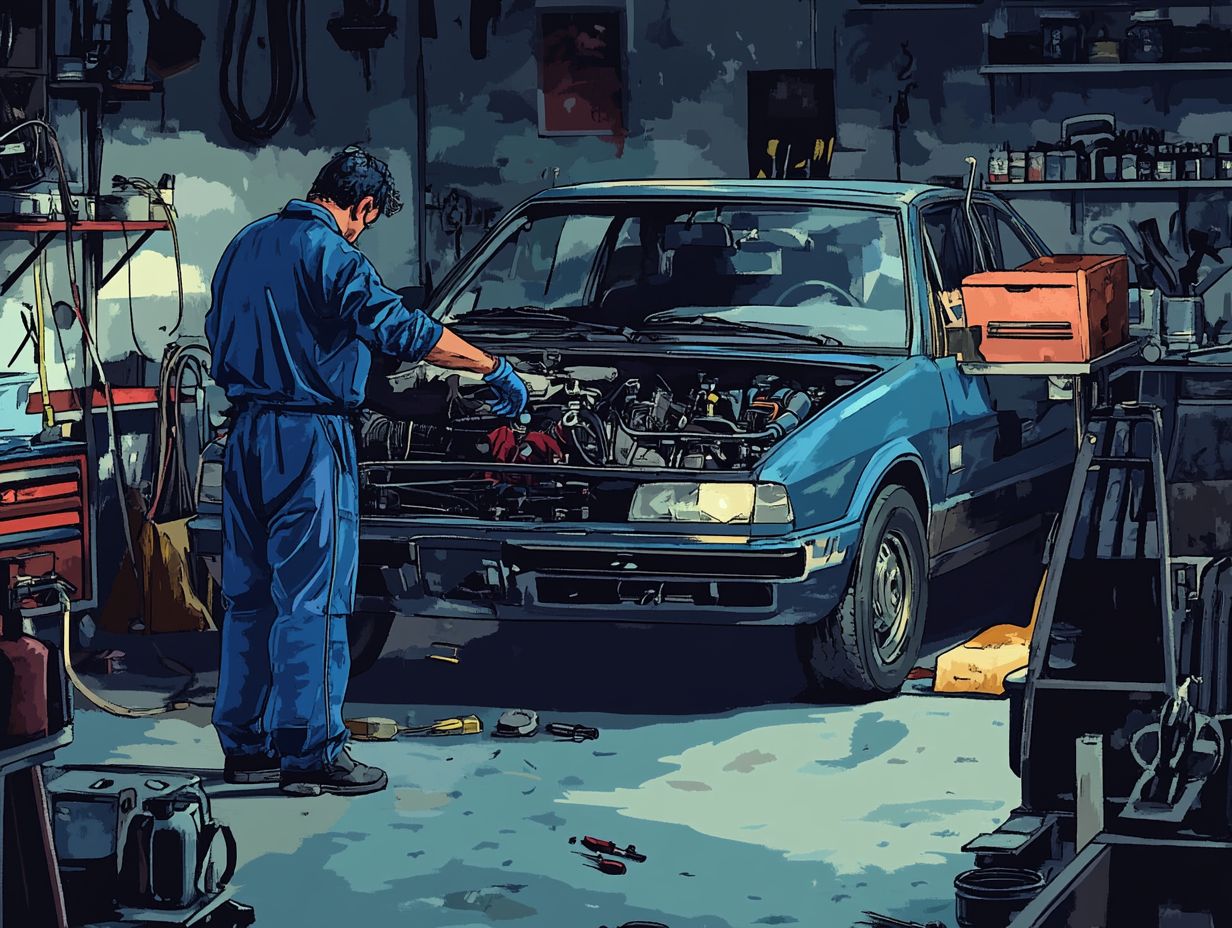
Here are some common questions about car maintenance:
What are the 5 benefits of regular car maintenance?
The 5 benefits of regular car maintenance are extended vehicle life, improved fuel efficiency, better performance, increased safety, and long-term cost savings.
Don’t wait! Schedule your maintenance check-up today!
How does regular car maintenance extend the life of my vehicle?
Regular car maintenance checks parts that wear out over time, like oil and filters. Keeping these parts in good shape helps your engine run longer.
Will regular car maintenance improve my car’s fuel efficiency?
Yes, regular maintenance keeps your engine clean and efficient. This leads to better fuel economy, saving you money at the pump!
How does regular car maintenance affect my car’s performance?
Regular maintenance keeps your car running smoothly, allowing you to enjoy better acceleration and handling on the road. For more insights, consider these 5 essential tips for common car maintenance.
Is regular car maintenance important for my safety?
Absolutely! Regular maintenance spots safety issues early. This includes checking brakes and tires to keep you safe.
Will regular car maintenance save me money in the long run?
Definitely! Staying up-to-date with maintenance prevents costly repairs later. It also helps maintain your car s value when it s time to sell or trade.

